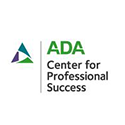Saying ‘no’ as a path to time management


Whether you are a dental student, an experienced
practitioner or someone just entering practice, time management is an important
skill that can help alleviate stress. In a new episode of the Beyond the
Mouth podcast from the ADA Center for Professional Success, Dr.
Erinne Kennedy discusses her solutions to dealing with stress as a student and
a new dentist. Early in her educational career, she began to feel overwhelmed
by all the projects she was taking on.
“I was a senior in dental school, and I was on a flight back
to Ft. Lauderdale with my mom,” Dr. Kennedy says. “I remember just crying and
saying ‘I can’t do this; I can’t keep up.’ That’s when I first realized that 1)
I probably felt a little burnt out, 2) I probably needed some help and some
resources, and 3) I started to learn to say no.”
However, Dr. Kennedy advises that simply saying no may not
remain an effective approach for long. Although she was able to initially
reduce her workload and her stress levels, within just a few months, she had
increased her involvement in additional initiatives.
“Saying yes is probably my greatest strength and my greatest
weakness at the same time,” she explains. “But when you say yes all the time,
all of a sudden you realize you’re the president of three different
organizations, and you have to sit back and ask yourself: Am I making an impact
when my time is so divided? I’ve found that sometimes you can make the most
impact when you start pruning things.”
Over time, Dr. Kennedy found that she could most effectively
manage her time by thinking of her life in terms of “seasons.” In a particular
season, she may dedicate herself to research, in another she may dedicate her
time to travel and working with students.
“Balance is an illusion and if you’re striving for balance,
you’re always going to be frustrated,” she says. “Balance is all about being
faithful to that season of life, and you just have to learn to respect the
season that you’re in.”
She also finds that journaling and adhering to her schedule
have helped her maintain perspective and keep her from taking on too much.
“I have a five-year journal,” she explains. “I write six
lines each day about my mood, a book I read, a famous quote, anything. And I
can look back over the five years and see my progress. I see that things I
thought were a big deal were maybe not such a big deal, and things that seemed
insignificant built up over time and turned into a huge blessing.”
Dr. Kennedy also says that she keeps a planner. “If you
don’t learn to plan your day and assign time to things and be punctual, it’s
easy to not make time for exercise, eating right or other things that are important.
My planner helps me set my priorities in a good way.”
Dr. Kennedy’s comments were lightly edited and drawn from Beyond the Mouth, a new podcast series from the ADA Center for Professional Success. Beyond the Mouth is available at ADA.org/BeyondtheMouth and through most major podcast distribution channels.
~ADA Center for Professional Success
This content is sponsored and does not necessarily reflect the views of ASDA.
This content was originally published here.
Leave a Comment